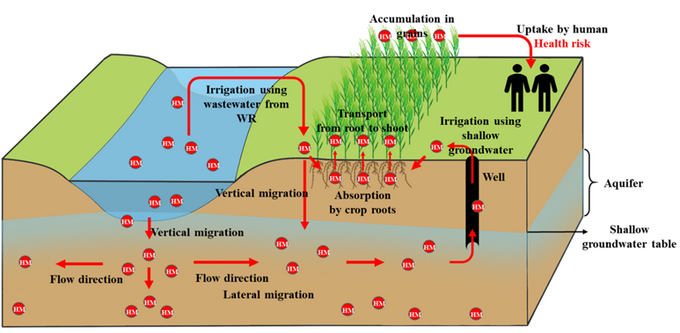Heavy metal risks to human health in farmland of wastewater-irrigated areas have long been recognized. It remains to be shown whether farmland heavy metals from wastewater irrigation can migrate to deeper soil at a regional scale.

A study by Shushen,Yang of the Center for Agricultural Resources Research (CARR), Institute of Genetics and Developmental Biology of CAS showed that heavy metals from wastewater irrigation can migrate downward to deep soil of 30 m, and wheat grains across the whole sampling area are of health risks in terms of total metal concentrations. The study was published in Environmental Pollution.
The researchers analysed a total of 400 soil layer samples, 41 composite wheat samples and 41 composite topsoil samples which are from deep soil sampling of nine soil cores down to 30 m and a regional sampling of farmland topsoils and wheat grains.
Considerably high contents of heavy metals in both total and soluble forms were detected in deep soils, especially for one transect where total As of 73.0 mg·kg-1 at 29 m, Cd of 3.80 mg·kg-1 at 13 m and Pb of 214 mg·kg-1
at 30 m were detected. Across the studied area, 19.5%–34.1% of the topsoil samples were contaminated by As, Cd, Cu, Pb and Zn, and 34.1% and 19.5% of the wheat grains were contaminated by Cd and Pb, respectively.
It is conventionally thought that downward migration of farmland heavy metals are normally less than 2m, while this study revealed a depth of 30m of heavy metal downward migration, and the topsoil and wheat grain sampling covered more than 10 km2. It is thus renewed our understanding that long-term wastewater irrigation has a wider and deeper impact than expected.
The results suggest that measures are urgently in need for the metal pollution control in the study area, and how to remediate the deep soil down to groundwater table remains a challenge.
The study was funded by the National Key Research and Development Program of China (No. 2018YFD0800306) and the Hebei Science Fund for Distinguished Young Scholars, China (No. D2018503005).
Xiaofang Li: xfli@sjziam.ac.cn; the Center for Agricultural Resources Research (CARR), Institute of Genetics and Developmental Biology of CAS ; http://english.sjziam.cas.cn/